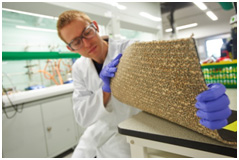Um dos pioneiros da química verde, Prof. James Clark tem extraído elementos químicos valiosos de resíduos sólidos. Ele vem ao Brasil para 38a RASBQ.

|
“Brazil needs to be at the heart of the new green and sustainable chemistry - with its wonderful resources it can show the world how we can all enjoy a good life but in a sustainable way.”
|
Da próxima vez que você chupar uma laranja ou falar pelo telefone celular, certamente vai se lembrar das palavras de alerta do professor James Clark, um dos pioneiros da química verde: "Há muita riqueza naquilo que jogamos no lixo", costuma dizer. "A química passará por profundas transformações no século 21. Os recursos tradicionais derivados do petróleo serão substituídos por recursos renováveis. Precisamos pensar no ciclo de vida das coisas."
O Professor Clark, diretor do Centro de Excelência em Química Verde da Universidade de York, na Inglaterra, será um dos participantes da 38a Reunião Anual da SBQ. Entusiasta do meio-ambiente e adepto do diálogo e trabalho conjunto com a indústria, ele tem ajudado diversos setores a buscar maior eficiência socioambiental nos processos de produção.
Ele alerta que alguns elementos têm sido muito utilizados e pouco resgatados antes de serem considerados "lixo". Um exemplo é o germânio, que pode ser considerado raro. "Estamos extraindo o germânio por mineração, fabricando telefones celulares e depois de um tempo os jogando no lixo", descreve Clark. "Esse modo de vida de extrair, processar, utilizar e jogar fora é insustentável."
Com sua equipe, Clark tem desenvolvido reações catalíticas ambientalmente mais eficientes, assim como processos baseados em energia de micro-ondas e ultrassônica, e novas formas de extrair elementos importantes de plantas. Mais recentemente pesquisadores de York conseguiram isolar elementos importantes da palha do trigo e converter amido e celulose em polímeros de maior valor agregado.
"Em York, somos guiados pela crença de que os recursos futuros estão naquilo que hoje chamamos de lixo: tiramos óleos de resto de maionese, produzimos móveis a partir da sílica nas cinzas, e das cascas de laranja extraímos biossolventes, fragrâncias, intermediários químicos, ácidos catalíticos, tanto material útil...", conta o Professor.
Formado pelo Kings College, de Londres, Clark está na vanguarda da química verde há cerca de 20 anos. Foi editor-fundador da revista Green Chemistry, edita livros de química verde para a Royal Society of Chemistry e preside a Green Chemistry Network. Tem mais de 400 artigos publicados com índice h 49.

Carpete reciclado feito pela equipe do Prof. Clark
Leia entrevista concedida ao Boletim da SBQ
SBQ: What are the goals of your research on green chemistry?
JC: I am interested in all things from the chemical point of view, and how we can make the same things more sustainable; this means looking across the whole life cycle and looking to use renewable resources, clean manufacturing and moving to new greener products that are both safe to use and can be used as a resource at the end of their normal use.
SBQ: How do your researches affect people’s daily life?
JC: What I do affects everyone - as everyone uses chemicals in everything they do! From when they shower in the morning, wear their clothes, drive to work, use computers, go shopping, sit on a comfortable chair to watch TV....all these things are based on chemicals! We need a new chemistry, green chemistry, to make all these things sustainable - to allow all the world’s population to have the same lifestyle, but we have to do this without putting more and more waste in the earth and without threatening people’s health, and in a way that does not diminish our precious resources on this wonderful but limited planet.
SBQ: How did you get hooked on chemistry?
JC: I liked chemistry from when I was very young because I found the idea of changing substances like turning something acidic into something salty very interesting! In more recent years I saw how my knowledge could help make chemistry more compatible with nature
SBQ: A message to the Brazilian chemical community…
JC: Brazil needs to be at the heart of the new green and sustainable chemistry - with its wonderful resources it can show the world how we can all enjoy a good life but in a sustainable way.
Para mais informações sobre o Prof. James Clark:
http://www.york.ac.uk/chemistry/staff/academic/a-c/jclark/
http://www.youtube.com/watch?v=vAqED2OvWOM
Artigos sugeridos sobre o trabalho do Prof. James Clark:
“Dihydrolevoglucosenone (Cyrene) as a bio-based alternative for dipolar aprotic solvents”, Sherwood, J.; De Bruyn, M.; Constantinou, A.; Moity, L.; McElroy, C. R.; Farmer, T. J.; Duncan, T.; Raverty, W.; Hunt, A. J.; Clark, J. H., Chem. Commun., 2014, 50, 9650.
“Direct microwave assisted hydrothermal depolymerisation of cellulose”, Fan, J.; De Bruyn, M.; Budarin, V. L.; Gronnow, M. J.; Shuttleworth, P. S.; Breeden, S.; Macquarrie, D. J.; Clark, J. H. J. Amer. Chem. Soc., 2013, 135, 11728-11731.
“Food waste as a valuable resource for the production of chemicals, materials, and fuels. General situation and global perspective”, Lin, C. S. K.; Pfaltzgraff, L. A.; Herrero-Davila, L.; Mubofu, E. B.; Solhy, A.; Clark, J. H. Koutinas, A., Kopsahelis, N., Stamatelatou, K., Dickson, F., Thankappan, S.; Zahouily, M.; Brocklesby, R.; Luque, R., Energy and Environmental Science, 2013, 426-464.
“Use of green chemical technologies in an integrated biorefinery”, Budarin, V. L.; Shuttleworth, P. S.; Dodson, J. R.; Hunt, A. J.; Lanigan, B.; Marriott, R.; Milkowski, K. J.; Wilson, Ashley J.; Breeden, S. W.; Fan, J.; Sin, E. H. K.; Clark, J. H., Energy & Environmental Science, 2011, 4, 471-479.
“Chemistry goes green”, Clark, J. H., Nature Chemistry, 2009, 1, 12-13.